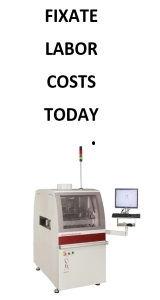Printed Circuit Board Assembly & PCB Design Forum
SMT electronics assembly manufacturing forum.
- SMTnet
- »
- Electronics Forum
- »
- Baking time for PCBA rework
Baking time for PCBA rework
![]() What is the baking time/temperature standard for the PCBA be...
- Jan 31, 2002
by
Dason C
What is the baking time/temperature standard for the PCBA be...
- Jan 31, 2002
by
Dason C
![]()
![]()
![]() There is no standard for baking an assembled board prior to ...
- Feb 03, 2002
by
davef
There is no standard for baking an assembled board prior to ...
- Feb 03, 2002
by
davef
![]()
![]()
![]() Dave highlighted all the elements that must be considered to...
- Feb 04, 2002
by
fmonette
Dave highlighted all the elements that must be considered to...
- Feb 04, 2002
by
fmonette
![]()
![]()
![]() I agree with Francois. We have just announced a 55 deg. C L...
- Feb 06, 2002
by
Stu Leech
I agree with Francois. We have just announced a 55 deg. C L...
- Feb 06, 2002
by
Stu Leech
![]()
![]()
![]() Francois/Sleech, thank you very much for your information, b...
- Feb 06, 2002
by
Dason C
Francois/Sleech, thank you very much for your information, b...
- Feb 06, 2002
by
Dason C
![]()
![]()
![]() Dason,
Please be aware that weight gain is only a very c...
- Feb 07, 2002
by
fmonette
Dason,
Please be aware that weight gain is only a very c...
- Feb 07, 2002
by
fmonette
![]()
![]()
![]() Here's a related question: How hot can a PBGA get before pop...
- Apr 23, 2002
by
Michael Allen
Here's a related question: How hot can a PBGA get before pop...
- Apr 23, 2002
by
Michael Allen
![]()
![]()
![]() I would sugest the lowere the baking temperature the better,...
- Apr 23, 2002
by
Matt N-Stott
I would sugest the lowere the baking temperature the better,...
- Apr 23, 2002
by
Matt N-Stott
![]()
![]()
![]() My first posting was not very clear -- sorry. Let me try ag...
- Apr 23, 2002
by
Michael Allen
My first posting was not very clear -- sorry. Let me try ag...
- Apr 23, 2002
by
Michael Allen
![]()
![]()
![]() Ooooo, much better.
Tough to say, because of all the vari...
- Apr 24, 2002
by
davef
Ooooo, much better.
Tough to say, because of all the vari...
- Apr 24, 2002
by
davef
![]()
![]()
![]() Michael,
This concern is well covered in J-STD-033, secti...
- Apr 25, 2002
by
fmonette
Michael,
This concern is well covered in J-STD-033, secti...
- Apr 25, 2002
by
fmonette
![]()
![]()
![]() Michael,
By the way, the default bake duration should be...
- Apr 25, 2002
by
fmonette
Michael,
By the way, the default bake duration should be...
- Apr 25, 2002
by
fmonette
![]()
Dason C
- SMTnet
- »
- Electronics Forum
- »
- Baking time for PCBA rework







